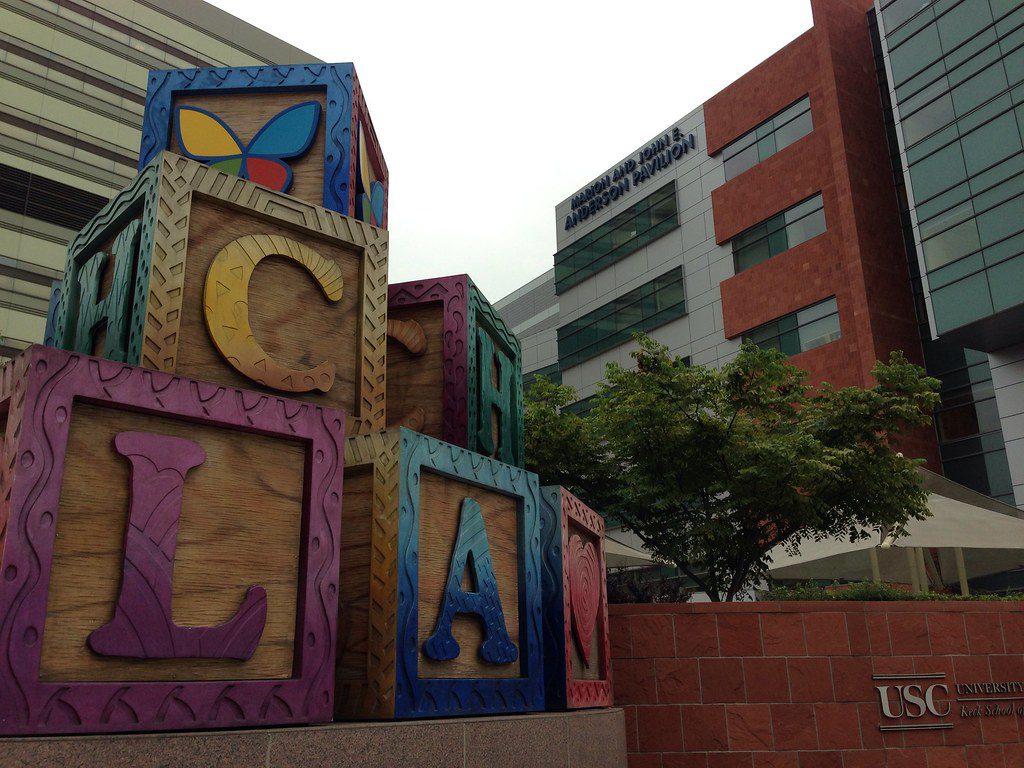 View Winners →
View Winners → 
CHLA. | Photo by Maria Sipin (CC BY 2.0)
Children’s Hospital Los Angeles has been awarded a five-year $2.5 million grant to train up to 190 pediatric residents to address the growing mental health crisis among children and youth, officials announced Monday.
The project is designed to train the CHLA residents in the primary care setting in mental and behavioral health care, says Dr. Christine Mirzaian, principal investigator and project director of the grant.
“By improving the infrastructure for mental and behavioral health problems so they may be addressed immediately in the primary care setting, we anticipate that children, adolescents and young adults will benefit greatly from this program,” Mirzaian said, adding that the initiative is a response to a lack of pediatric mental health services and the increasing number of teenagers dying from substance use.
Home to one of the largest pediatrician training programs in the United States, CHLA is the only freestanding children’s hospital included among the two-dozen grant recipients nationwide and the only hospital in Los Angeles County awarded. The grant for CHLA’s Division of General Pediatrics is funded by the Health Resources and Services Administration as part of the Bipartisan Safer Communities Act.
“It was inspiring to visit Children’s Hospital Los Angeles and see firsthand how their doctors, nurses, and staff are coming together to address our nation’s mental health crisis,” said Carole Johnson, administrator of HRSA.
“We know that often, the first person you turn to when you or your kids need mental health support is your trusted primary care provider, like the team at CHLA,” she said. “Yet for too long, we haven’t given those primary care providers the mental health training they need to help. With funding from the Bipartisan Safer Communities Act, the Health Resources and Services Administration is investing in making mental health a part of primary care training so that there is no wrong door when your family needs support.”
The hospital will facilitate the program and related research study in collaboration with the South Central Prevention Coalition, a community agency with a 28-year record of empirically based substance use prevention and culturally responsive programming. CHLA residents will receive directed training at the agency site and benefit from having a psychologist integrated in their primary care clinic to set protocols on acute mental and behavioral health concerns.
The goal is to equip primary care pediatricians, on both the attending physician and pediatric residency levels, to better address pediatric mental and behavioral health needs, “especially given the often-limited resources and referral options our community faces,” Mirzaian said.
“In addition, we hope that by improving the self-efficacy of primary care physicians to treat their patients, it will reduce provider burnout and frustration,” she said.
Over the course of the study, the CHLA psychologists, administrators and physicians on the research and clinical education team will train doctors enrolled in the CHLA Pediatric Residency program, where more than half of residents provide care in medically underserved areas.
“We hope that this will improve mental and behavioral health access for young people in our community for years to come,” Mirzaian said.
CHLA team members from General Pediatrics, the USC University Center for Excellence in Developmental Disabilities, Pediatric Residency Program, the Division of Adolescent and Young Adult Medicine and the National Center for School Crisis and Bereavement will oversee such research components as evaluation, community-based participatory research, and medical informatics required by the grant.







































































































